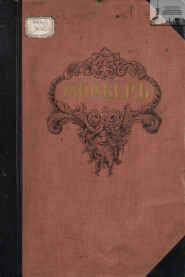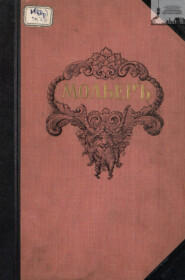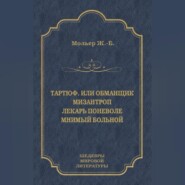По всем вопросам обращайтесь на: info@litportal.ru
(©) 2003-2025.
✖
Monsieur De Pourceaugnac
Год написания книги
2017
Настройки чтения
Размер шрифта
Высота строк
Поля
Mr. Pour. I leave you in this gentleman's hands. Doctors dressed in black. In a chair. Feel the pulse. In proof of what I say. He is mad. Two big, fat-faced fellows, with large-brimmed hats. Buon dì, buon dì. Six pantaloons. Ta, ra, ta, toi, ta, ra, ta, ta, toi. Allegramente, Monsu Pourceaugnac. Take, Sir; take, take. It is gentle, gentle, gentle. Piglialo sù, Signor Monsu; piglialo, piglialo sù. I never was so surfeited with absurdities in all my life.
Sbri. What does it all mean?
Mr. Pour. It means, Sir, that this gentleman, with all his kissing and hugging, is a deceitful rascal, who has sent me to that house to play me some trick.
Sbri. Is it possible?
Mr. Pour. It is, indeed. They were a dozen devils at my heels, and I had all the difficulty in the world to escape out of their clutches.
Sbri. Just fancy how deceitful people's looks are; I should have taken him for the most affectionate friend you have. It is a wonder to me how there can exist such rascals in the world.
Mr. Pour. My imagination is full of it all; and it seems to me that I see everywhere a dozen injections threatening me.
Sbri. This is really too bad! how treacherous and wicked people are!
Mr. Pour. Pray, tell me where Mr. Oronte lives. I should be glad to go there at once.
Sbri. Ah! ah! you are of a loving disposition, I see; and you have heard that Mr. Oronte has a daughter?
Mr. Pour. Yes; I am come to marry her.
Sbri. To ma … to marry her?
Mr. Pour. Yes.
Sbri. In wedlock?
Mr. Pour. How could it be otherwise?
Sbri. Oh! it is another thing, and I beg your pardon.
Mr. Pour. What is it you mean?
Sbri. Oh, nothing.
Mr. Pour. But, pray!
Sbri. Nothing, I tell you. I spoke rather hastily.
Mr. Pour. I beg of you to tell me what it is.
Sbri. No; it is not necessary.
Mr. Pour. Pray do.
Sbri. No; I beg you to excuse me.
Mr. Pour. What! are you not one of my friends?
Sbri. Yes, certainly; nobody more so.
Mr. Pour. Then you ought not to hide anything from me.
Sbri. It is a thing in which a neighbour's honour is concerned.
Mr. Pour. That I may oblige you to treat me like a friend, here is a small ring I beg of you to keep for my sake.
Sbri. Let me consider a little if I can in conscience do it. (Goes away a small distance from Mr. de Pourceaugnac.) He is a man who looks after his own interests, who tries to provide for his daughter as advantageously as possible; and one should injure nobody. It is true that these things are no secret; but I shall be telling them to a man who knows nothing about it, and it is forbidden to talk scandal of one's neighbour. All this is true. On the other hand, however, here is a stranger they want to impose upon, who comes in all good faith to marry a girl he knows nothing about, and whom he has never seen. A gentleman all openheartedness, for whom I feel some inclination, who does me the honour of reckoning me his friend, puts his confidence in me, and gives me a ring to keep for his sake. (To Mr. de Pourceaugnac) Yes, I think that I can tell you how things are without wounding my conscience. But I must try to tell it all to you in the mildest way possible, and to spare people as much as I can. If I were to tell you that this girl leads a bad life, it would be going too far. I must find some milder term to explain myself. The word coquette does not come up to the mark; that of downright flirt seems to me to answer the purpose pretty well, and I can make use of it to tell you honestly what she is.
Mr. Pour. They want to make a fool of me then?
Sbri. But it may not be so bad as people think; and after all, there are men who set themselves above such things, and who do not think that their honour depends upon…
Mr. Pour. I am your servant; I have no wish to adorn my person with such a head-dress, and the Pourceaugnacs are accustomed to walk with their heads free.
Sbri. Here is the father.
Mr. Pour. Who? this old man?
Sbri. Yes. Allow me to withdraw.
SCENE V. – ORONTE, MR. DE POURCEAUGNAC
Mr. Pour. Good morning, Sir; good morning.
Oro. Your servant, Sir; your servant.
Mr. Pour. You are Mr. Oronte; are you not?
Oro. Yes.
Mr. Pour. And I, Mr. de Pourceaugnac.
Oro. Ah, indeed!
Mr. Pour. Do you think, Mr. Oronte, that the people of Limoges are fools?
Oro. Do you think, Mr. de Pourceaugnac, that the people of Paris are asses?
Mr. Pour. Do you imagine, Mr. Oronte, that a man like me can be dying for a wife?
Oro. Do you imagine, Mr. de Pourceaugnac, that a daughter like mine can be dying for a husband?
SCENE VI. – MR. DE POURCEAUGNAC, JULIA, ORONTE
Jul. I have just been told, father, that Mr. de Pourceaugnac has come. Ah, there he is, no doubt; my heart tells me so. How handsome he is! How splendidly he holds himself. How pleased I am to have such a husband![11 - See act i, scene iii.] Give me leave to kiss him and to show him…
Oro. Softly, daughter, softly.
Sbri. What does it all mean?
Mr. Pour. It means, Sir, that this gentleman, with all his kissing and hugging, is a deceitful rascal, who has sent me to that house to play me some trick.
Sbri. Is it possible?
Mr. Pour. It is, indeed. They were a dozen devils at my heels, and I had all the difficulty in the world to escape out of their clutches.
Sbri. Just fancy how deceitful people's looks are; I should have taken him for the most affectionate friend you have. It is a wonder to me how there can exist such rascals in the world.
Mr. Pour. My imagination is full of it all; and it seems to me that I see everywhere a dozen injections threatening me.
Sbri. This is really too bad! how treacherous and wicked people are!
Mr. Pour. Pray, tell me where Mr. Oronte lives. I should be glad to go there at once.
Sbri. Ah! ah! you are of a loving disposition, I see; and you have heard that Mr. Oronte has a daughter?
Mr. Pour. Yes; I am come to marry her.
Sbri. To ma … to marry her?
Mr. Pour. Yes.
Sbri. In wedlock?
Mr. Pour. How could it be otherwise?
Sbri. Oh! it is another thing, and I beg your pardon.
Mr. Pour. What is it you mean?
Sbri. Oh, nothing.
Mr. Pour. But, pray!
Sbri. Nothing, I tell you. I spoke rather hastily.
Mr. Pour. I beg of you to tell me what it is.
Sbri. No; it is not necessary.
Mr. Pour. Pray do.
Sbri. No; I beg you to excuse me.
Mr. Pour. What! are you not one of my friends?
Sbri. Yes, certainly; nobody more so.
Mr. Pour. Then you ought not to hide anything from me.
Sbri. It is a thing in which a neighbour's honour is concerned.
Mr. Pour. That I may oblige you to treat me like a friend, here is a small ring I beg of you to keep for my sake.
Sbri. Let me consider a little if I can in conscience do it. (Goes away a small distance from Mr. de Pourceaugnac.) He is a man who looks after his own interests, who tries to provide for his daughter as advantageously as possible; and one should injure nobody. It is true that these things are no secret; but I shall be telling them to a man who knows nothing about it, and it is forbidden to talk scandal of one's neighbour. All this is true. On the other hand, however, here is a stranger they want to impose upon, who comes in all good faith to marry a girl he knows nothing about, and whom he has never seen. A gentleman all openheartedness, for whom I feel some inclination, who does me the honour of reckoning me his friend, puts his confidence in me, and gives me a ring to keep for his sake. (To Mr. de Pourceaugnac) Yes, I think that I can tell you how things are without wounding my conscience. But I must try to tell it all to you in the mildest way possible, and to spare people as much as I can. If I were to tell you that this girl leads a bad life, it would be going too far. I must find some milder term to explain myself. The word coquette does not come up to the mark; that of downright flirt seems to me to answer the purpose pretty well, and I can make use of it to tell you honestly what she is.
Mr. Pour. They want to make a fool of me then?
Sbri. But it may not be so bad as people think; and after all, there are men who set themselves above such things, and who do not think that their honour depends upon…
Mr. Pour. I am your servant; I have no wish to adorn my person with such a head-dress, and the Pourceaugnacs are accustomed to walk with their heads free.
Sbri. Here is the father.
Mr. Pour. Who? this old man?
Sbri. Yes. Allow me to withdraw.
SCENE V. – ORONTE, MR. DE POURCEAUGNAC
Mr. Pour. Good morning, Sir; good morning.
Oro. Your servant, Sir; your servant.
Mr. Pour. You are Mr. Oronte; are you not?
Oro. Yes.
Mr. Pour. And I, Mr. de Pourceaugnac.
Oro. Ah, indeed!
Mr. Pour. Do you think, Mr. Oronte, that the people of Limoges are fools?
Oro. Do you think, Mr. de Pourceaugnac, that the people of Paris are asses?
Mr. Pour. Do you imagine, Mr. Oronte, that a man like me can be dying for a wife?
Oro. Do you imagine, Mr. de Pourceaugnac, that a daughter like mine can be dying for a husband?
SCENE VI. – MR. DE POURCEAUGNAC, JULIA, ORONTE
Jul. I have just been told, father, that Mr. de Pourceaugnac has come. Ah, there he is, no doubt; my heart tells me so. How handsome he is! How splendidly he holds himself. How pleased I am to have such a husband![11 - See act i, scene iii.] Give me leave to kiss him and to show him…
Oro. Softly, daughter, softly.

















